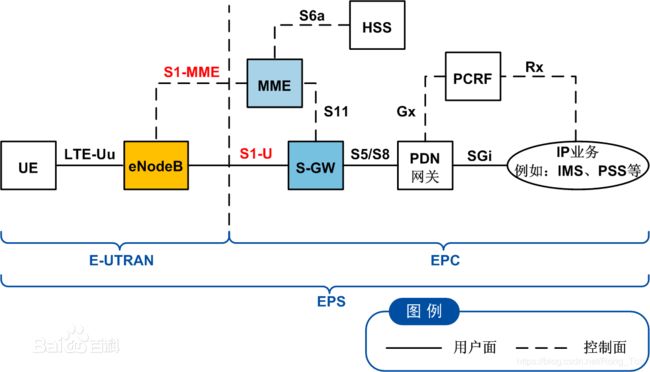srsLTE源码学习:S1接口抓包s1ap_pcap.h,s1ap_pcap.cc
Table of Contents
介绍
图例
代码
s1ap_pcap.h
s1ap_pcap.cc
s1ap_test.cc
介绍
- S1接口是LTE eNodeB(基站)与 EPC(分组核心网)之间的通讯接口。
- 将LTE系统划分为无线接入网和核心网。
- S1接口沿袭了承载和控制分离的思想,又分成两个接口,一个用于控制平面(S1-MME),一个用于用户平面(S1-U)。
- 控制平面接口S1-MME将基站和移动性管理实体(MME)相连,主要完成S1接口的无线接入承载控制、接口专用的操作维护等功能。
- 用户平面接口S1-U将基站和服务网关(S-GW)连接,用于传送用户数据和相应的用户平面控制帧。
图例
代码
s1ap_pcap.h
lib\include\srslte\common 1665 4/11/2019 1
#ifndef SRSLTE_S1AP_PCAP_H
#define SRSLTE_S1AP_PCAP_H
#include "srslte/common/pcap.h"
namespace srslte {
//S1接口是LTE eNodeB(基站)与 EPC(分组核心网)之间的通讯接口。
//将LTE系统划分为无线接入网和核心网。
//S1接口沿袭了承载和控制分离的思想,又分成两个接口,一个用于控制平面(S1-MME),一个用于用户平面(S1-U)。
//控制平面接口S1-MME将基站和移动性管理实体(MME)相连,主要完成S1接口的无线接入承载控制、接口专用的操作维护等功能。
//用户平面接口S1-U将基站和服务网关(S-GW)连接,用于传送用户数据和相应的用户平面控制帧。
/*
S6a
| +-----HSS Rx
S1-MME | | +--PCRF--------------+
+-------|----MME--+ | |
| | |S11 | | =====> 控制面
Uu | | S1-U | S5/S8 | SGi
UE ----->eNodeB ----|--------S-GW --------> PDN网关 --------> IP业务 =====> 用户面
|
|
E-UTRAN | EPC
*/
class s1ap_pcap
{
public:
s1ap_pcap() {enable_write=false; pcap_file = NULL; }
void enable();
void open(const char *filename);
void close();
void write_s1ap(uint8_t *pdu, uint32_t pdu_len_bytes);
private:
bool enable_write;
FILE *pcap_file;
};
} //namespace srslte
#endif // SRSLTE_NAS_PCAP_H
s1ap_pcap.cc
lib\src\common 653 2/28/2019 19
#include
#include "srslte/srslte.h"
#include "srslte/common/pcap.h"
#include "srslte/common/s1ap_pcap.h"
namespace srslte {
void s1ap_pcap::enable()
{
enable_write = true;
}
void s1ap_pcap::open(const char* filename)
{
pcap_file = LTE_PCAP_Open(S1AP_LTE_DLT, filename);
enable_write = true;
}
void s1ap_pcap::close()
{
fprintf(stdout, "Saving S1AP PCAP file\n");
LTE_PCAP_Close(pcap_file);
}
void s1ap_pcap::write_s1ap(uint8_t *pdu, uint32_t pdu_len_bytes)
{
if (enable_write) {
S1AP_Context_Info_t context;
if (pdu) {
LTE_PCAP_S1AP_WritePDU(pcap_file, &context, pdu, pdu_len_bytes);
}
}
}
}
s1ap_test.cc
lib\test\asn1 2025 2/28/2019 22
/**
*
* \section COPYRIGHT
*
* Copyright 2013-2019 Software Radio Systems Limited
*
* \section LICENSE
*
* This file is part of the srsLTE library.
*
* srsUE is free software: you can redistribute it and/or modify
* it under the terms of the GNU Affero General Public License as
* published by the Free Software Foundation, either version 3 of
* the License, or (at your option) any later version.
*
* srsUE is distributed in the hope that it will be useful,
* but WITHOUT ANY WARRANTY; without even the implied warranty of
* MERCHANTABILITY or FITNESS FOR A PARTICULAR PURPOSE. See the
* GNU Affero General Public License for more details.
*
* A copy of the GNU Affero General Public License can be found in
* the LICENSE file in the top-level directory of this distribution
* and at http://www.gnu.org/licenses/.
*
*/
#include "srslte/asn1/liblte_s1ap.h"
#include "srslte/common/log_filter.h"
#include
#include
void unpack_test_served_gummeis_with_multiple_plmns() {
srslte::log_filter log1("Log");
log1.set_level(srslte::LOG_LEVEL_DEBUG);
log1.set_hex_limit(1024);
LIBLTE_S1AP_S1AP_PDU_STRUCT compare_pdu;
LIBLTE_S1AP_S1AP_PDU_STRUCT output_pdu;
LIBLTE_BYTE_MSG_STRUCT input_pdu;
uint8_t pdu[] = {0x20, 0x11, 0x00, 0x26, 0x00, 0x00, 0x02, 0x00, 0x69,
0x00, 0x1a, 0x01, 0x40, 0x00, 0xf1, 0x10, 0x00, 0xf1,
0x10, 0x00, 0xf1, 0x10, 0x00, 0xf1, 0x10, 0x00, 0xf1,
0x10, 0x00, 0xf1, 0x10, 0x00, 0x00, 0x88, 0x88, 0x00,
0x7b, 0x00, 0x57, 0x40, 0x01, 0xff};
input_pdu.N_bytes = sizeof(pdu);
memcpy(&input_pdu.msg, pdu, sizeof(pdu));
log1.debug_hex(input_pdu.msg, input_pdu.N_bytes, "Input message len = %d",
input_pdu.N_bytes);
assert(liblte_s1ap_unpack_s1ap_pdu((LIBLTE_BYTE_MSG_STRUCT *)&input_pdu,
&output_pdu) == LIBLTE_SUCCESS);
}
int main(int argc, char **argv) {
unpack_test_served_gummeis_with_multiple_plmns();
}
